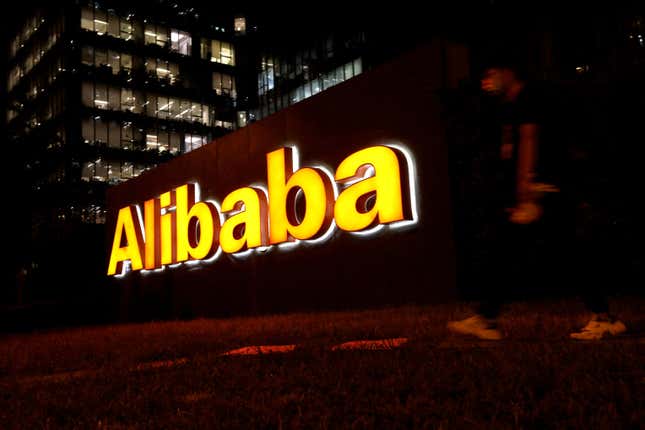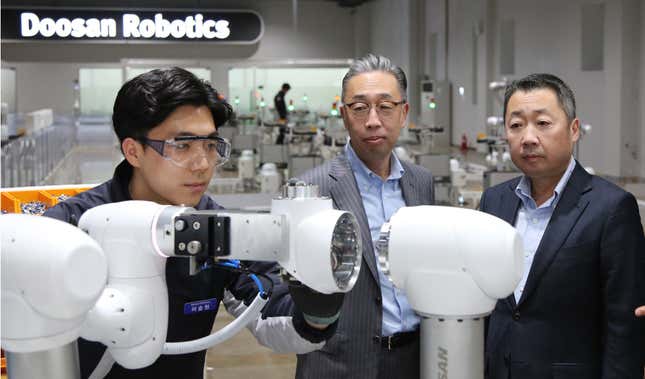
Good morning, Quartz readers! Just a heads up, you won’t be receiving a Daily Brief on Monday, as our US-based team takes the day off. We’ll see you back in your inbox on Tuesday.
Here’s what you need to know
A Belgian probe is investigating Alibaba. It all centers around a logistics hub in Liège, which Belgian security services suspect of carrying out “espionage and/or interference activities,” which Alibaba denies.
China announced big space station plans. Tiangong is going from three modules to six, which extends its operating lifespan, just as the NASA-led International Space Station cruises toward retirement.
Wealthy countries pledged billions to help poorer countries combat climate change. The pledges top $9 billion thus far, but environmental organizations have thoughts, particularly about who’s not on the list.
Hyundai and Kia are adopting Tesla’s charging ports. The auto brands are the latest to incorporate North American Charging Standard Ports into their EVs in the US and Canada so their drivers can use a bigger, faster charging network across the continent.
Norwegian author Jon Fosse won the Nobel Prize in Literature. His spare style, which touches on deep emotions, has come to be known as “Fosse minimalism.”
One small number (12%) and one good point (Janet Yellen’s)
12%: Share of global chip manufacturing the US can call its own, a number that the Biden administration’s $280 billion CHIPS Act aims to grow
“We’re fooling ourselves if we think that abandoning, for all practical purposes, semiconductor manufacturing is a smart strategy for the United States,” said US Treasury secretary Janet Yellen at a roundtable organized by Fortune Magazine this week.
Yellen hasn’t always been such a strong supporter of industrial policy, and many critics deride the CHIPS Act as a waste of money that will leave the US industry reliant on the government and thus uncompetitive. But Yellen has a great point, says Quartz’s Tim Fernholz, who can back it up with a look at the US semiconductor industry’s roots in TVs and the space program.
Finally, the beer-serving robot future is here

Cobots: A cute-sounding word that means “collaborative robots” in industry parlance. It’s the big moneymaker for Doosan Robotics, whose cobots serve beer, make coffee, and deep-fry chicken.
Doosan is also South Korea’s biggest IPO of the year, raising $312 million on the Seoul stock exchange at its Thursday debut. Faustine Ngila reports on South Korea’s robot hopes, and Doosan’s plans to put its cobots in more places around the globe.
Walmart is showing how AI is changing retail
Quartz reporter Michelle Cheng just toured a Walmart Supercenter in Secaucus, New Jersey, where she checked out some of the retailer’s new AI technology. There, the company’s senior vice president of operations was quick to say that the store’s 750-employee workforce hasn’t been reduced.
But retail is one of the fastest growing markets for AI. At Walmart, it’s taken the shape of apps that gauge restocking needs and shelf placement, and consumer-facing iterations help locate items in the notoriously massive stores. The technology may still be far from perfect, but the world’s biggest private employer is betting billions that it’ll pay off.
Quartz’s most popular
🧑⚕️ A hidden system of exploitation underpins US hospitals’ employment of foreign nurses
😬 The US economic outlook is turning bearish with a bond selloff and weak payroll data
🤔 Does the US speaker of the House need to be in Congress?
🚄 Why China laid the tracks for Indonesia’s first high-speed rail
🧶 The all-out revolt against Knitting.com helps explain boycotts at Reddit and Etsy
Surprising discoveries
Our solar system might have another Kuiper belt beyond the one we already knew about. It’s Kuiper belts all the way down!
You can now own Shrek music. Not a recording of Shrek music, you can be an investor in the music itself and get paid every time someone streams the movie or hears a tune on a theme park ride.
AI watermarks aren’t watertight. A computer science professor tested out current technology intended to combat disinformation and handily broke all of it.
The US redrew some maps in a hypothetical, scary way to get citizens on board with entering World War II. It worked.
Boards Shakespeare possibly trod hath been found. Evidence is a little flimsy as to whether the Bard actually did set foot on these just-discovered floorboards at a Norfolk, UK theater.
Our best wishes for a productive day. Send any news, comments, really old wooden planks, and belts around belts to [email protected]. Reader support makes Quartz available to all—become a member. Today’s Daily Brief was brought to you by Morgan Haefner and Susan Howson.